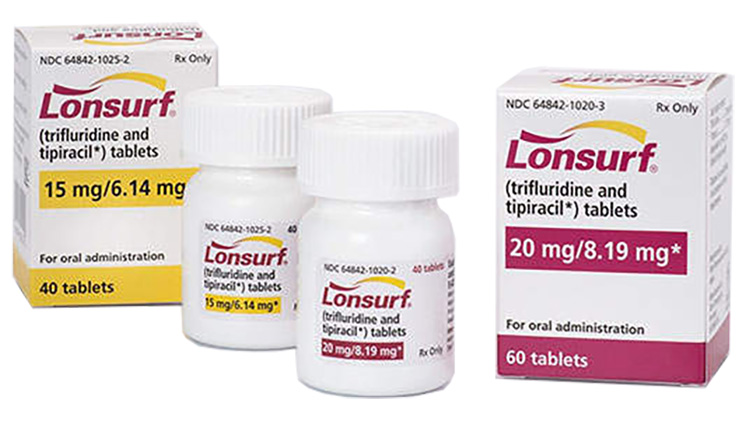Lonsurf (trifluridine/tipiracil) vs Keytruda (pembrolizumab)
Lonsurf (trifluridine/tipiracil) vs Keytruda (pembrolizumab)
Lonsurf (trifluridine/tipiracil) is an oral chemotherapy drug used primarily for the treatment of metastatic colorectal cancer after standard therapy has failed, and it works by incorporating into DNA and inhibiting cell growth. Keytruda (pembrolizumab), on the other hand, is an intravenous immunotherapy medication that targets the PD-1/PD-L1 pathway, thereby enhancing the body's immune response against cancer cells, and is used for a variety of cancers, including melanoma, non-small cell lung cancer, and head and neck cancers, among others. The choice between Lonsurf and Keytruda would depend on the type of cancer, its genetic characteristics, previous treatments, and the patient's overall health status, which should be evaluated by a healthcare professional to determine the most appropriate therapy.
Difference between Lonsurf and Keytruda
| Metric | Lonsurf (trifluridine/tipiracil) | Keytruda (pembrolizumab) |
|---|---|---|
| Generic name | Trifluridine/tipiracil | Pembrolizumab |
| Indications | Metastatic colorectal cancer, Gastric cancer, Gastroesophageal junction adenocarcinoma | Various cancers including melanoma, non-small cell lung cancer, head and neck squamous cell cancer, classical Hodgkin lymphoma, primary mediastinal large B-cell lymphoma, urothelial carcinoma, microsatellite instability-high cancer, gastric cancer, esophageal cancer, cervical cancer, hepatocellular carcinoma, Merkel cell carcinoma, renal cell carcinoma, endometrial carcinoma, and tumor mutational burden-high cancer |
| Mechanism of action | Antimetabolite chemotherapy; incorporates into DNA and inhibits thymidylate synthase | Immune checkpoint inhibitor; blocks PD-1, enhancing T-cell response against cancer cells |
| Brand names | Lonsurf | Keytruda |
| Administrative route | Oral | Intravenous |
| Side effects | Nausea, fatigue, anemia, neutropenia, thrombocytopenia, diarrhea, decreased appetite, etc. | Fatigue, cough, nausea, itching, rash, decreased appetite, constipation, joint pain, diarrhea, etc. |
| Contraindications | Severe bone marrow suppression, severe hepatic impairment, severe renal impairment, known hypersensitivity to trifluridine/tipiracil or excipients | Severe hypersensitivity to pembrolizumab or any of its excipients |
| Drug class | Antimetabolite, nucleoside metabolic inhibitor | Monoclonal antibody, PD-1 inhibitor |
| Manufacturer | Taiho Oncology, Inc. | Merck Sharp & Dohme Corp. |
Efficacy
Lonsurf (trifluridine/tipiracil) Efficacy in Colorectal Cancer
Lonsurf, a combination of trifluridine and tipiracil, is an oral chemotherapeutic agent used in the treatment of metastatic colorectal cancer (mCRC) in patients who have been previously treated with chemotherapy and biological therapy. The efficacy of Lonsurf was demonstrated in a pivotal Phase III trial (RECOURSE), which showed that Lonsurf significantly improved overall survival compared to placebo. Patients treated with Lonsurf had a median overall survival of 7.1 months compared to 5.3 months for those receiving placebo. The progression-free survival was also modestly improved in the Lonsurf group.
While the improvement in survival is statistically significant, it is important to note that Lonsurf is generally considered a third-line or later treatment option. It is typically used when other treatments have failed or are no longer effective. The benefit of Lonsurf is particularly seen in extending survival and providing an additional treatment option for patients with limited alternatives, rather than being a curative approach to colorectal cancer.
Keytruda (pembrolizumab) Efficacy in Colorectal Cancer
Keytruda, known generically as pembrolizumab, is an immune checkpoint inhibitor that has shown efficacy in the treatment of certain types of colorectal cancer. Specifically, Keytruda is indicated for the treatment of patients with metastatic colorectal cancer that has high microsatellite instability (MSI-H) or mismatch repair deficiency (dMMR), conditions that are present in a subset of colorectal cancers. These biomarkers indicate that the cancer cells have a higher number of mutations, which may make them more visible to the immune system.
In clinical studies, Keytruda has demonstrated significant response rates in patients with MSI-H or dMMR mCRC. The KEYNOTE-177 trial, a Phase III study, compared Keytruda to standard chemotherapy in first-line treatment of these patients and found that Keytruda significantly improved progression-free survival. The median progression-free survival was 16.5 months for patients receiving Keytruda compared to 8.2 months for those on chemotherapy. Additionally, the overall response rate was higher in the Keytruda group, and the treatment was associated with fewer severe side effects than traditional chemotherapy.
Regulatory Agency Approvals
Lonsurf
-
European Medical Agency (EMA), European Union

-
Food and Drug Administration (FDA), USA

-
Health Canada

-
Therapeutic Goods Administration (TGA), Australia

Keytruda
-
European Medical Agency (EMA), European Union

-
Food and Drug Administration (FDA), USA

-
Health Canada

-
Therapeutic Goods Administration (TGA), Australia

-
Medsafe (NZ)

Access Lonsurf or Keytruda today
If Lonsurf or Keytruda are not approved or available in your country (e.g. due to supply issues), you can access them via Everyone.org.
How it works

Make an enquiry
Choose the medicine you want to buy, answer a couple of questions, and upload your prescription to speed things up. We’ll get back to you within 24 hours.


Make an enquiry
Choose the medicine you want to buy, answer a couple of questions, and upload your prescription to speed things up. We’ll get back to you within 24 hours.


Breeze through the paperwork
We'll guide you through the required documents for importing unapproved medicine, ensuring you have all the necessary information.


Get a personalized quote
We’ll prepare a quote for you, including medicine costs and any shipping, administrative, or import fees that may apply.


Receive your medicine
Accept the quote and we’ll handle the rest - sourcing and safely delivering your medicine.

Some text on this page has been automatically generated. Speak to your physician before you start a new treatment or medication.
Let's talk
If you have any questions, call us or send us a message through WhatsApp or email:
Contact us




